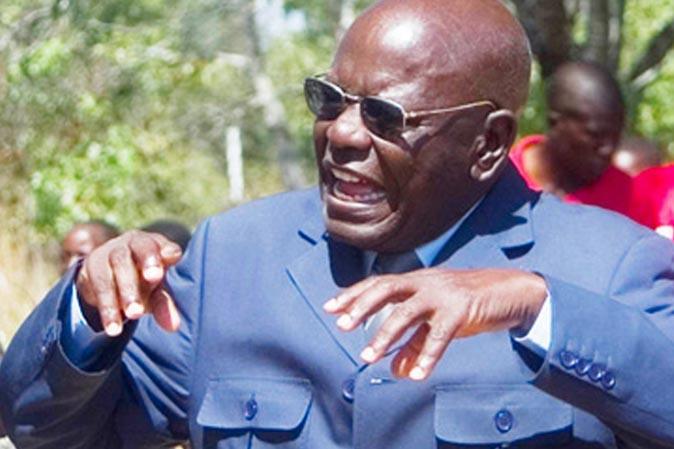
The dismissal of Didymus Mutasa and Temba Mliswa’s application against expulsion from Parliament by the Constitutional Court (ConCourt) last week seems to imply that political parties have the power to expel their MPs from the House, political analysts have said.
BY PAIDAMOYO MUZULU/CHARLES LAITON
Chief Justice Godfrey Chidyausiku read the unanimous decision of the nine-member bench which dismissed the duo’s application as “devoid of merit” and thus upheld the Speaker of Parliament’s decision to declare the Headlands and Hurungwe seats vacant.
Mutasa and Mliswa, through their lawyer Lovemore Madhuku, had argued that the Speaker had acted unconstitutionally by declaring their seats vacant without hearing their side of the story in their dispute with Zanu PF.
Madhuku said the Speaker had an obligation to certify himself of the facts before acting or alternatively referring the matter to courts if there was a dispute between the parties.
University of Zimbabwe political science lecturer, Eldred Masunungure was of the view that the judgement by the ConCourt was sound.
“The judgement of the court was not in any way politically motivated. It is simply that the argument that the duo had put forward was not sustainable at law,” Masunungure said.
“Unlike the MDC Renewal team, who are also questioning their expulsion from Parliament, their argument is very different from Mutasa and Mliswa because they are challenging the expulsion on the basis that it is not supported by the party Constitution. The judgement of the court cannot be faulted from a legal standpoint.”
- Chamisa under fire over US$120K donation
- Mavhunga puts DeMbare into Chibuku quarterfinals
- Pension funds bet on Cabora Bassa oilfields
- Councils defy govt fire tender directive
Keep Reading
Masunungure said what remained to be seen now was the performance of the duo in the forthcoming elections as they have indicated they would stand as independent candidates in their respective constituencies.
President Robert Mugabe has already set April 8 as the date when the nomination court will sit, while the by-elections in the two constituencies and 14 others will be held on June 10.
Political analyst Takura Zhangazha said political party leaders were elated by the decision of the Concourt. “Leaders of political parties that are represented in Parliament are obviously feeling almost invincible vis-a-vis the decision,” Zhangazha said.
“Unfortunately, the spring in their step after this decision by the ConCourt is symptomatic of a patent lack of intraparty democracy which unfortunately comes to negatively affect the already undemocratic national political environment.”
Another political analyst, Tamuka Chirimambowa concurred with Zhangazha, but added that the country lacked consistency and deeply grounded values.
“We have become a society driven by opportunism and convenience,” Chirimambowa said. He said the decision reinforced the perception that “what Zanu PF wants, Zanu PF gets”.
Early last month President Robert Mugabe, who was officiating at the commissioning of Africa Chrome Fields (ACF) smelting plant in Chirumanzu, said the courts should not entertain Mutasa’s application. Mugabe said: “If there is a magistrate or judge who will want to preside over this matter, then I would like to know where he/she went to school and where he/she got the powers to rule over Zanu PF.”
The President added, “I will ask because this matter is not one for the courts. If we say we no longer want you in our party and want you to leave, is that a problem?”
Lawyers approached for comment were reluctant to speak saying they wanted to read the court’s full judgement first.
Lawyer and MDC-T spokesperson Obert Gutu said: “It’s difficult to comment on the soundness of the judgement without reading the reasoning behind the decision.”
Another lawyer and MDC Renewal spokesperson Jacob Mafume said: “Most in the fraternity are waiting to read the full judgement, especially after the eloquent presentations in court before making comments.”
However, since its inception in 2013, the ConCourt has rarely given full written judgments, with most of its decisions being extempore. It remains to be seen when the judgement will be released.
Another political analyst, Charles Mangongera described the judgement as a “kiss of death” for Mutasa and Mliswa, adding that their political careers were now doomed.
“Outside Zanu-PF they will find it difficult to maintain national relevance,” Mangongera said. “They will definitely be shut out of public significance for a long time. Right now they are getting sympathy from the private media but that sympathy will soon wane off and they will be left in isolation.”
Mangongera said Mutasa and Mliswa were riding on Zanu-PF’s politics of patronage and when they lost in court, they lost almost everything.
“For instance, all their properties, farms and whatever they acquired while in power, were being protected by Zanu PF and they were basking in its glory. Now that everything is gone, they are no longer with the party, they will have to brace themselves for a tough time,” he said.
“Unlike Mujuru, she still has sympathy not only from the private media but from the whole country. But, I don’t think she has that moral courage to stand up and form a coalition party because she is also aware that these guys [Zanu PF] have a lot of skeletons in their cupboards, they will always have an axe hanging above anyone booted out of the party.”
Mangongera added: “It will be difficult for them to be in the spotlight again and they will be in limbo for a long time, that Lazarus moment of resurrection, for them is just but a long way to come.” He said riding on Zanu-PF’s back has been quite profitable for a number of politicians in Zimbabwe who have amassed a lot of wealth, some through unscrupulous means, all in the name of the party.









